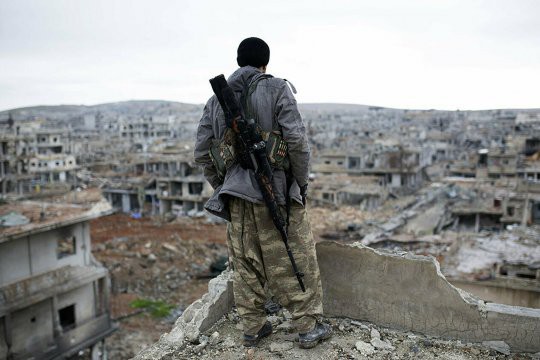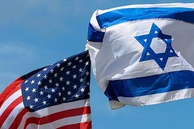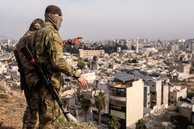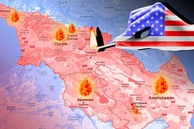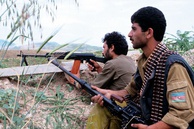For decades, the Kurdish problem was overshadowed by the Palestinian one, occasionally popping up in international media reports following the much-publicized arrest of the leader of the Kurdistan Workers' Party (PKK), the genocide of Iraqi Kurds and the scandalous referendum in Iraqi Kurdistan. A few years ago, the Syrian and Iraqi Kurds’ opposition to the "Islamic State" (banned in Russia) pushed them to the forefront of global politics with the media now talking about the so-called "Kurdish Spring."
In short, the Kurdish problem boils down not only to the absence of independent statehood for 40 million people, who account for approximately 20 percent of the population of Turkey and Iraq, and between eight and 15 percent of Iran and Syria, but also to the refusal by Ankara, Tehran and Damascus to discuss the possibility of an autonomous status for the Kurds. Today, the very issue of Kurdish independence is being hushed up, at least in public.
The first example of Kurdish statehood in modern history was in Iran: in 1946, the Kurdish Autonomous Republic was proclaimed in the city of Mahabad, only to survive less than a year. Since then, the Iranian authorities have spared no effort to make sure the name of one of the country’s provinces (Kurdistan Ostan) is the only remainder of the Kurds’ presence in the Islamic Republic. The situation is further aggravated by the fact that the Kurds, most of whom happen to be Sunnis, are a hurdle on Tehran’s official course to achieve the religious unity of the Iranian people.
Since all Kurdish organizations, let alone political parties, are outlawed, most of them are based in neighboring Iraqi Kurdistan. For most Kurdish organizations, the original goal of gaining independence has increasingly been transformed into a demand for autonomy for Kurds inside Iran.
The other “pole” of Kurdish nationalism is Iraqi Kurdistan. The history of the region’s autonomy goes back to 1970, and since the 90s, it has been sponsored by the Americans, who needed a ground base for the “Gulf War.” In 2003, the Iraqi Peshmerga helped the Anglo-American troops to topple the country’s ruling Ba'athist regime.
Under the current Iraqi constitution, Kurdistan enjoys broad autonomy, bordering on the status of an independent state with nearly 40 foreign consulates general, including a Russian one, officially operating in the regional capital Erbil, and in Sulaymaniyah.
Following the referendum on independence (2017), which was not recognized by either Baghdad or the world community (except Israel), Baghdad sent troops into the region, forcing the resignation of the President of the Kurdistan Regional Government and the founder of the Kurdistan Democratic Party (KDP) Massoud Barzani. He has maintained a close presence though, with both the current president and the prime minister bearing the same surname.
According to various sources, the armed forces of the Iraqi Kurds number between 80,000 to 120,000, armed with heavy weapons, armored vehicles and tanks, and their number keeps growing. Who are they going to fight? Erbil is on fairly good terms with Turkey and Iran, the autonomy’s two “windows to the world,” and you don’t need a huge army to keep the remnants of jihadist forces in check, do you? Iraq? Iraq is a different matter though, given the presence of disputed territories, the unsettled issue of distribution of oil export revenues, and a deep-seated rejection of the 2017 Iraqi military invasion.
However, the political ambitions of the Barzani and Talabani clans, who divided Iraqi Kurdistan into zones of influence back in the 70s, are obviously offset by oil revenues, and are unlikely to extend beyond the “return” of the territories lost to Baghdad in 2017.
The Turkish factor is a major factor in the life of Iraqi Kurdistan: several thousand Turkish military personnel are deployed there, checking the activity of mountains-based armed units of the Kurdistan Workers’ Party, which is branded by Ankara as a “terrorist” organization. Baghdad is unhappy about their presence, while Erbil, rather, pretends to be unhappy as it is in a state of undeclared war with the PKK itself. At the same time, Turkish soldiers are standing by to nip in the bud any further attempts by the region’s Kurdish authorities to gain sovereignty as Ankara fears that an independent Kurdish state will set a "bad example" for Kurds living in Turkey proper.
During the 1980s, several regions in southeastern Turkey declared themselves “liberated” from Ankara. In 1984, the “Marxist-Leninist” PKK (created in 1978) prevailed over all the other local Kurdish groups and declared war on the Turkish authorities. Following the arrest of their leader in 1999, the PKK militants were squeezed out of the country into Syria and Iraq, despite the fact that discarding the slogan of creating a "united and independent" Kurdistan, the party had already settled for a demand for Kurdish autonomy within Turkish borders.
For many decades, the Turkish authorities denied the very existence of Kurds as an ethnic group. During the 2000s, in a bid to sweeten the pill for the Kurds, and meeting the requirements of the European Union, the Turkish government came up with the so-called "Kurdish initiative," lifting the ban on the use of the Kurdish language, returning Kurdish names to a number of settlements, etc.
Legal organizations and parties, advocating the rights of the Kurds, were granted greater freedom of action. However, this did not prevent the authorities from banning such parties for "connections with terrorists" and "separatism." The current Kurdish party (creation of any associations on a national basis is prohibited) - the Peoples' Democracy Party - is also under serious pressure with some of its leading members currently behind bars.
However, the apparent defeat in the military conflict with NATO's second largest army is forcing Turkey's Kurdish nationalists to focus on a legal political struggle.
During the past few years the main attention of the international community has for obvious reasons been focused on the Syrian Kurds, who for many decades remained “second-class citizens” or even stateless persons in their own country. Any manifestations of discontent, which occasionally boiled over into uprisings, was severely suppressed by the authorities.
With the outbreak of the civil war, the Kurds assumed the position of armed neutrality, and in 2012, announced the creation of their own statehood with the capital in El Qamishli. Six years later, the name of the quasi-state was changed from a "democratic federation" to an "autonomous administration,” meant to demonstrate the refusal by the authorities of Syrian Kurdistan to pursue their initial demand for independence.
Needless to say, that change of priorities was prompted by the occupation by Turkish troops and their proxies of parts of the Kurdish territories. In 2019, Ankara halted its military advance only after the Kurds had allowed Syrian troops into the areas under their control, and international players “dissuaded” Ankara from any further expansion.
In addition to the Turkish factor, another important factor with a serious bearing on the situation are US troops and members of American military companies who remain in northeastern Syria without any legal grounds for their presence. Back when the current US President was Chairman of the Senate Foreign Relations Committee, he promoted the idea of creating a Kurdish state in Iraq and Syria. The Kurds have long lost their faith in Washington’s desire to grant them independence, but in bargaining with Damascus for the delimitation of powers, they never miss a chance to refer to US support.
However, in recent years, the Syrian Kurds (and not only them) have had ample opportunity to feel the results of Washington’s unreliability as a partner.
A lack of trust in the Americans, on the one hand, and the constant threat from Turkey, on the other, are forcing the Kurdish leaders to ramp up the negotiation process with the leadership of the Syrian Arab Republic. Moreover, the Kurds are pinning their hopes for the success of the negotiations primarily on the mediation of Russia, given Moscow’s allied relations with the Syrian authorities. [i] Besides, Moscow maintains working ties with the leadership of the self-proclaimed autonomy, and with the leaders of the opposition Kurdish parties.
Meanwhile, the negotiations are stalling with Damascus opposed to the idea of either autonomy or the preservation of the Kurdish armed forces’ organizational independence. It is still imperative, however, for the sides to agree on certain conditions. The "return" of the Kurds can become a turning point in the intra-Syrian confrontation as the Americans will feel too “uncomfortable” in a united Syria, and the Turks will lose the main argument for their continued occupation of the border zone, which will now be controlled not by "terrorists," but by the central government. Which, by the way, is gaining more and more legitimacy even in the eyes of yesterday's irreconcilable opponents.
The views of the author are his own and may differ from the position of the Editorial Board.
[i] See https://eadaily.com/ru/news/2021/11/10/rossiya-ne-hochet-chtoby-eshchyo-bolshe-territoriy-sirii-byli-okkupirovany-turciey-mnenie, https://www.kommersant.ru/doc/499471, https://www.kommersant.ru/doc/5060755?from=author_1;
read more in our Telegram-channel https://t.me/The_International_Affairs

 16:46 19.01.2022 •
16:46 19.01.2022 •
